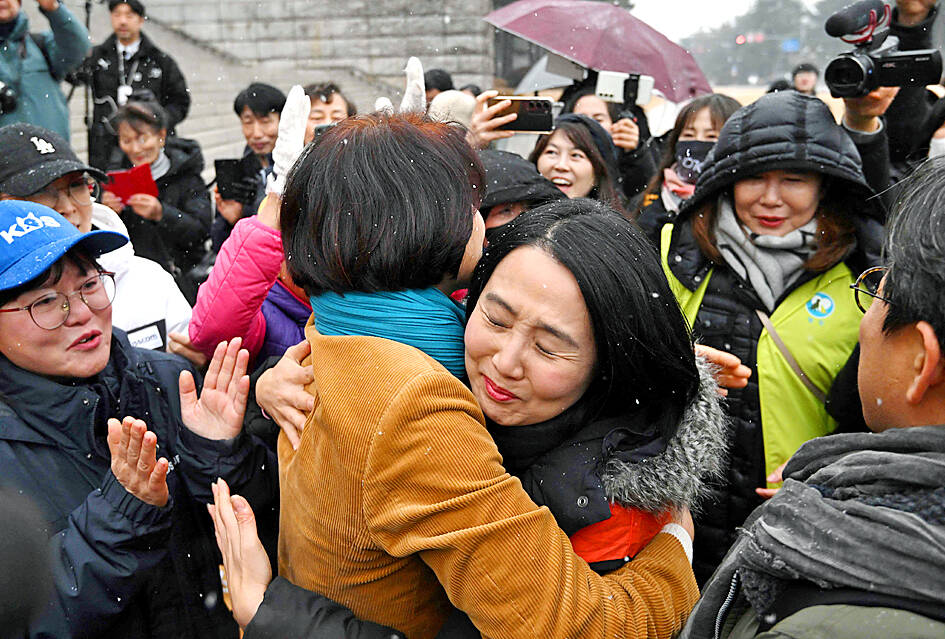The South Korean parliament yesterday passed a bill banning breeding, slaughtering and selling dogs for their meat, a traditional practice that animal rights advocates have called an embarrassment for the nation.
Dog meat has long been a part of South Korean cuisine, and at one point up to 1 million dogs were killed for the trade every year, but consumption has sharply declined as South Koreans embrace pet ownership in droves.
Eating dog meat is a taboo among younger, urban South Koreans and pressure on the government to outlaw the practice from animal rights advocates has been mounting.

Photo: AFP
Official support for a ban has grown under South Korean President Yoon Suk-yeol, a self-professed animal lover who has adopted several stray dogs and cats with first lady Kim Keon-hee — who is herself a vocal critic of dog meat consumption.
The bill, which was proposed by the ruling and main opposition parties, was passed unopposed by a 208-0 vote, with two abstentions.
It is to come into effect following a three-year grace period after it receives final approval from Yoon.
Under the law, breeding, selling and slaughtering dogs for their meat would be punishable by up to three years in prison or 30 million won (US$22,728) in fines.
“Now there is no longer any justification for being criticized as a ‘dog-eating country,’” said Thae Yong-ho, a ruling People Power Party lawmaker who proposed the bill.
“The ruling and opposition parties and the government must now take the lead in protecting ... animal rights,” he said in a statement.
Animal rights advocates and some lawmakers gathered outside the National Assembly to celebrate the passing of the bill, with people cheering and waving posters saying: “Goodbye dog meat consumption” and “dog meat free Korea is coming.”
“We reached a tipping point where most [South] Korean citizens reject eating dogs and want to see this suffering consigned to the history books,” Chae Jung-ah, executive director of Humane Society International/Korea, said in a statement. “Today our policymakers have acted decisively to make that a reality. While my heart breaks for all the millions of dogs for whom this change has come too late, I am overjoyed that South Korea can now close this miserable chapter in our history and embrace a dog-friendly future.”
In a survey released on Monday by Seoul-based think tank Animal Welfare Awareness, Research and Education, nine out of 10 people in South Korea said they would not eat dog meat.
The vote was a pioneering decision globally, Animal Liberation Wave said, adding that it would pave the way for protecting the rights of other animals.
“The journey towards a ‘dog meat-free Republic of Korea’ can be a starting point for not only liberating dogs, but also presenting different standards and a future for other species of animals that are subject to industrial exploitation, such as cows, pigs, and chickens,” it said in a statement.
Previous efforts to ban dog meat have run into fierce opposition from farmers who breed dogs. The new law provides compensation so that businesses can move out of the trade.

The CIA has a message for Chinese government officials worried about their place in Chinese President Xi Jinping’s (習近平) government: Come work with us. The agency released two Mandarin-language videos on social media on Thursday inviting disgruntled officials to contact the CIA. The recruitment videos posted on YouTube and X racked up more than 5 million views combined in their first day. The outreach comes as CIA Director John Ratcliffe has vowed to boost the agency’s use of intelligence from human sources and its focus on China, which has recently targeted US officials with its own espionage operations. The videos are “aimed at

STEADFAST FRIEND: The bills encourage increased Taiwan-US engagement and address China’s distortion of UN Resolution 2758 to isolate Taiwan internationally The Presidential Office yesterday thanked the US House of Representatives for unanimously passing two Taiwan-related bills highlighting its solid support for Taiwan’s democracy and global participation, and for deepening bilateral relations. One of the bills, the Taiwan Assurance Implementation Act, requires the US Department of State to periodically review its guidelines for engagement with Taiwan, and report to the US Congress on the guidelines and plans to lift self-imposed limitations on US-Taiwan engagement. The other bill is the Taiwan International Solidarity Act, which clarifies that UN Resolution 2758 does not address the issue of the representation of Taiwan or its people in

US Indo-Pacific Commander Admiral Samuel Paparo on Friday expressed concern over the rate at which China is diversifying its military exercises, the Financial Times (FT) reported on Saturday. “The rates of change on the depth and breadth of their exercises is the one non-linear effect that I’ve seen in the last year that wakes me up at night or keeps me up at night,” Paparo was quoted by FT as saying while attending the annual Sedona Forum at the McCain Institute in Arizona. Paparo also expressed concern over the speed with which China was expanding its military. While the US

SHIFT: Taiwan’s better-than-expected first-quarter GDP and signs of weakness in the US have driven global capital back to emerging markets, the central bank head said The central bank yesterday blamed market speculation for the steep rise in the local currency, and urged exporters and financial institutions to stay calm and stop panic sell-offs to avoid hurting their own profitability. The nation’s top monetary policymaker said that it would step in, if necessary, to maintain order and stability in the foreign exchange market. The remarks came as the NT dollar yesterday closed up NT$0.919 to NT$30.145 against the US dollar in Taipei trading, after rising as high as NT$29.59 in intraday trading. The local currency has surged 5.85 percent against the greenback over the past two sessions, central